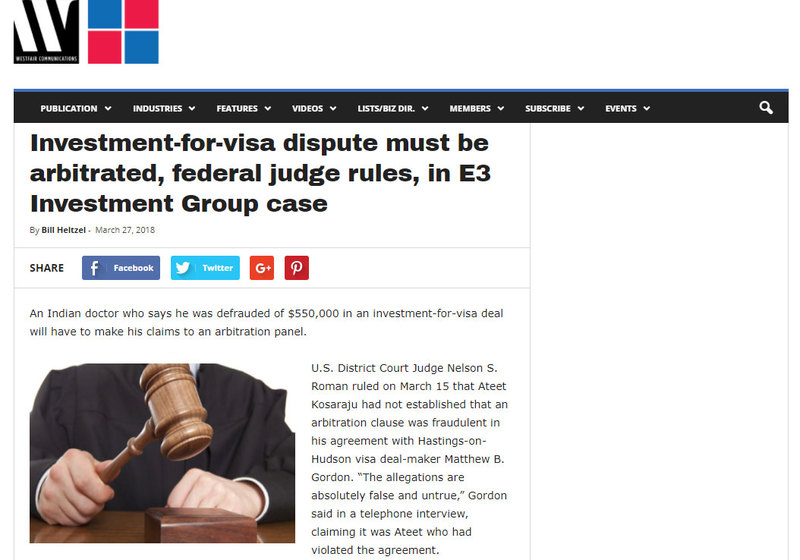Investment-for-visa dispute must be arbitrated, federal judge rules, in E3 Investment Group case
An Indian doctor who says he was defrauded of $550,000 in an investment-for-visa deal will have to make his claims to an arbitration panel.
U.S. District Court Judge Nelson S. Roman ruled on March 15 that Ateet Kosaraju had not established that an arbitration clause was fraudulent in his agreement with Hastings-on-Hudson visa deal-maker Matthew B. Gordon. “The allegations are absolutely false and untrue,” Gordon said in a telephone interview, claiming it was Ateet who had violated the agreement.
Gordon is chief executive officer of E3 Investment Group in Manhattan. He describes himself on the company’s website as an expert and frequent lecturer on the EB-5 Immigration Investor Program.
The EB-5 program allows immigrant entrepreneurs to qualify for permanent residence if they make a minimum investment of $500,000 and create 10 full-time jobs in the U.S. Visa deals are structured, the E3 website says, “so we can ultimately repay our investors, do well for ourselves and do good for the communities in which we operate.”
Ateet, of Astoria, Queens, says he paid $500,000 to E3 to invest in a trucking company and another $55,000 in fees. But the 2017 federal lawsuit he filed claims the limited partnership he bought into owned no trucks and created no jobs.
Gordon, he alleged, “diverted the entire investment for his personal benefit.”
In 2015, Ateet was an Indian medical school graduate and was pursuing a medical residency in the U.S. The E3 offering document allegedly promised that a $500,000 investment would give him the right to a green card, ownership of property, access to the court system and Social Security benefits.
He alleges he was promised that he would own and co-manage a trucking business that had 10 trucks and employed 10 drivers and receive a 6 percent return on the investment. His father, Dr. Joyti Kosaraju, mortgaged the family home and gave Ateet the money to invest with E3.
Ateet became a limited partner in E3 Cargo51. He received $2,500 a month for a few months, he says, then payments stopped.
He was not permitted to participate in managing the partnership, as required by the EB-5 program, according to the complaint, and he was given no financial reports for more than two years. Ateet withdrew his residency petition in 2016 to pursue U.S. residency by other means, and he demanded the return of his investment.
Ateet claims that Gordon told him that his investment had been converted to debt because he had withdrawn his residency petition. Gordon allegedly refused to return Ateet’s money and admitted that E3 Cargo 51 did not own any trucks. It’s only assets were accounts receivable.
When Ateet continued to demand the return of his investment, he says, Gordon encouraged him and his father to bring in new investors to “create additional cash flow, from which we could pay Ateet.”
Gordon said he provided documents on numerous occasions, followed the partnership agreement “to the T,” and did everything he was supposed to do. “All of the assets were acquired and all the people were hired,” Gordon said.
Gordon asked the court to compel arbitration, citing the dispute resolution clause that called for controversies or claims to be settled before the American Arbitration Association. Judge Roman agreed.
Ateet had enumerated many alleged misrepresentations, he found, but the accusations relate to the contract generally and not to the arbitration clause specifically. A claim of fraudulent inducement of an arbitration clause may be adjudicated by a court, Nelson ruled, but “a claim of fraudulent inducement of the entire contract is to be decided by the arbitrator rather than the court.”
A month ago, another Indian, Natasha Dubash, sued Gordon and E3 in federal court, Manhattan, making similar allegations. She claims Gordon induced her to invest $500,000 in a trucking business in 2014, plus $55,000 in fees, and then two years later got her to loan another $300,000.
Dubash says the entity she invested in ceased operations and she “never received the return on her investment that was described by Gordon and the offering documents.”
Gordon said the new lawsuit is also without merit and that there is already a preliminary agreement to voluntarily dismiss the case. “There’s not much news here,” he said.
Mentions
States
- New York
Securities Disclaimer
This website is for informational purposes only and does not constitute an offer or solicitation to sell shares or securities. Any such offer or solicitation will be made only by means of an investment's confidential Offering Memorandum and in accordance with the terms of all applicable securities and other laws. This website does not constitute or form part of, and should not be construed as, any offer for sale or subscription of, or any invitation to offer to buy or subscribe for, any securities, nor should it or any part of it form the basis of, or be relied on in any connection with, any contract or commitment whatsoever. EB5Projects.com LLC and its affiliates expressly disclaim any and all responsibility for any direct or consequential loss or damage of any kind whatsoever arising directly or indirectly from: (i) reliance on any information contained in the website, (ii) any error, omission or inaccuracy in any such information or (iii) any action resulting therefrom.




